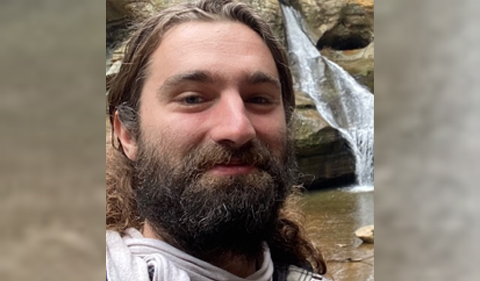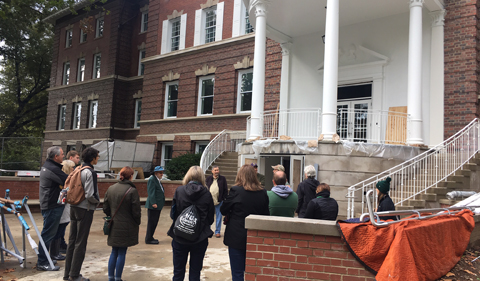Ohio University alumnus Nicholas Lawrence Shooner passed away at the age of 24 on March 14, according to his obituary.
Nick graduated from Roger Bacon High School on June 5, 2015. Nick graduated high school with honors and was active in soccer, track, underwater hockey, and concert band. He graduated from Ohio University Magna Cum Laude May 5, 2018 with a Bachelor of Arts degree. Nick completed his Master of Arts degree from Ohio University on August 15, 2020.
Nick had a passion for music. He was a piano and a guitar enthusiast. He would play for hours creating his own variations on songs. He was a skilled trumpet player as well. He loved to encourage friends and family to play music together at any gathering regardless of instrument. Nick loved the outdoors. He found peace with hiking, backpacking, and experiencing nature. Nick had a passion for learning, for writing and for debating. He enjoyed understanding then arguing a topic.
Shooner earned two Philosophy degrees from the College of Arts & Sciences, a B.A. in 2018 and an M.A. in 2020.
Nick’s professors and classmates in Philosophy were struck by his intellectual talent, passion, and insatiable curiosity. Emeritus Professor of Philosophy Philip Ehrlich, recalls, “Nick took several classes with me and I always found his passion for philosophy and for the life of reason more generally to be a rarity among rarities during my 50 years of teaching and studying philosophy.”
“He took several of my courses,” remembers Dr. Alyssa Bernstein, “both as an undergrad and as a grad student, and he excelled in all of them. Over the years we had many long conversations about a wide range of philosophical topics as well as about life. In some of these conversations he discussed philosophy in a way that was serious, probing, and interesting, but in others he played with ideas in ways that turned out to be surprisingly fruitful as well as fun. Nick enjoyed philosophy and helped others to enjoy it.”
“Nick was a force of nature who affected everyone with whom he came in contact,” recalls classmate Jacob Coleman. “He put forth ideas, from perspectives very foreign to my own, that were insightful and thought-provoking. He played a role in my life during the time I knew him that I previously did not know needed filling and will go unfilled for years to come, likely for the rest of my life. This is an immense loss, not just for us who knew him, but for all those that he would have met.”
Dr. Christoph Hanisch recalls how much he enjoyed impromptu discussions he had with Nick. “Pre-Covid, I used to work almost exclusively at Lindley/Ellis, and more than once Nick knocked at my office door on a Sunday afternoon, always very quietly and politely asking: ‘Doctor Hanisch, do you have a minute…I was thinking about something that you said in class the other day….’ Of course, the one minute turned into an exciting and stimulating one (or two) hours. Nick’s comments and thoughts made me rethink the issue(s) in question (and how I delivered them in the respective seminar meeting). I will forever be grateful to him for this kind of input.”
Zach Renfro (M.A. 2019) remembers, “Nick was a common sight at Ohio University and one could often find him sitting in a shady spot pondering some mystery of the universe. We were classmates and we often had hours-long philosophical discussions in the TA office over whatever Nick was pondering that day. He forced me to reflect on many things which I would have never thought about. My life is truly better having known him.”
And Dr. James Petrik, chair of the Philosophy Department, observed, “Nick was an exceptionally bright student, one of the most naturally gifted I have taught over 30 years. He loved discussing philosophy, but also possessed an unquenchable curiosity that extended well beyond philosophy. I recall many conversations in which he would surprise me with the range of topics he could engage with depth and insight. Our discussions would frequently include his uttering the phrase, ‘So, here is a cool possibility,’ and he would proceed to lay out different implications of a theory on, say, the metaphysics of time, that he would then develop in light of contemporary work in physics. In truth, I often had a hard time keeping up with his reasoning. His mind just worked faster than mine.”
Reflecting on Nick’s character, Petrik observed, “Another of Nick’s noteworthy traits was a complete lack of pretense. He enjoyed talking to anyone at any time about anything, and never gave off even the faintest hint of finding someone else’s thoughts not worth his time.”
Others were also struck by Nick’s generosity of spirt. Samantha Stewart (M.A. 2020) recalls the effect that Nick had on his cohort of graduate students. “Even with the most tense of discussions, Nick was the first one to suggest we all get a beer together and talk things out. And every single time, with the most open mind, he would sit and listen to try as hard as he could to understand. He was one of my very first friends in the department, and I’ll never see the world the same because of him. I’m unendingly grateful for his optimism that we could always figure it out. I didn’t realize until now how much I came to rely on Nick’s unlimited curiosity, friendship, and intelligence.”
Another classmate, Wil Crow (M.A. 2020), recalled Nick’s ability to take sincere interest in others and their passions. “I once took a group of fellow graduate students to a Latin Mass in Churchtown, and Nick was among them. His questions and respectful engagement were very well received and appreciated.”
Penny Nutter, the Philosophy Department’s office manager from 1994 to 2020, recalled, “Although I didn’t get into deep philosophical thinking and discussions with Nick, I saw in him a genuine kindness and caring about others. My day-to-day interactions with him in Ellis were always uplifting. When my job was abolished last year, he was the first to reach out to me…it really meant a lot.”
Classmate Dylan Vanover recalls, “Nick and I developed our friendship during the senior seminar. One day, we both arrived early to class. During this time, he would often carry a loaf of bread, a jar of peanut butter, and butter knife so that he could have a snack throughout his school day. Typical of Nick, he was quick to offer me one of his peanut butter sandwiches. We ate our sandwiches together, and little did I know, this would be the beginning of a friendship that I will forever deeply cherish.
“I liked to call him Socrates,” Vanover remarked, “because he was always quick to challenge my assumptions about any given topic, and, through patient dialogue, was able to demonstrate I had no idea what I was talking about. His philosophical discussions were anything but limited to the department. Nick talked about philosophy with everyone. It was common to walk into the Skull or Casa and find Nick talking with fellow patrons about epistemology, object-relations, and complex topics over a beer. Nick demonstrated in his everyday life that philosophy is for everyone.”
Such was Nick’s character that he made a strong impression even on those who met him only once or twice. Associate Professor of Philosophy Amy White’s experience was typical. “Nick was the first graduate student of ours that I talked to in person. After One OHIO started, I attended a few events at Little Fish with the department and Nick was always present. He was eager to engage and make me feel welcome. I aspire to the degree of laidbackness (yes, I just invented this term in honour of Nick) that he displayed. His curious nature seemed without bounds.”
Many who knew Nick were familiar with his talents as a musician. Dr. Scott Carson, who may have known Nick the longest of any philosophy faculty member, recalls meeting Nick when he arrived at OHIO as a freshman in 2015. “I was playing trumpet in the University Band and at our first rehearsal that fall in walks this guy who looked for all the world like The Dude, wearing a T-shirt, jeans, sandals, and that long hair with the huge smile. He came in and sat in the chair next to me and immediately struck up a conversation. I had no idea he was only a freshman, he was so bright and articulate and was chatting with me, a (at that time) 57-year-old man, like I was his brother. His trumpet playing was astonishingly good, and I thoroughly enjoyed playing with him in that ensemble for two years.”
Fellow musician Dylan Vanover recalls playing music with Nick. “From the Grateful Dead and Neil Young, to the Byrds and Bob Dylan, Nick was down to jam on anything. He would get lost in our jam sessions and become enveloped in the music. As I would play rhythm guitar, I would love watching him bow his head, shake his hair, and squinch his face as he would lay down a solo and try to find the right notes to complement the mood of the song. He was also an outstanding singer. As you could imagine, he had a baritone voice, but it was powerful and loud. He wasn’t afraid to belt out and put his heart into it. This always impressed me because I had always been very timid and nervous when singing in front of others. Nick’s vulnerability and confidence were not something confined to his music, it was an essential part of his identity.”
Hanisch adds, recalling occasions on which their impromptu Sunday afternoon discussions turned to music, “Nick and I had a very similar taste when it came to popular music. On several occasions, he impressed me with his detailed expertise on, among other things, the early 1990s Grunge movement, a genre that I thought I knew everything about. Thanks to Nick, I now know that I was incorrect about this, as my understanding of music and American culture more generally grew significantly, thanks to our long and thorough conversations.”
Carson summarized the sentiments of many when he observed, “Nick was a truly astonishing young man, and I cannot find words sufficient to express my regret at the loss of one so young and promising, but I’m thankful that I was able, if only for a brief time, to share some ontological space with him.”




















Comments